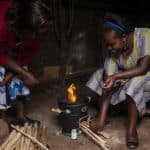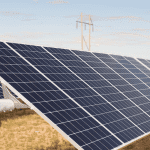How Loan Guarantees Are Unlocking Private Capital for Clean Energy and Sustainable Agriculture
MCE Social Capital (MCE), a nonprofit impact investing firm, was founded in 2006 on the belief that loan guarantees – an ancient finance mechanism – can uniquely unlock private sector capital for the more than 2 billion people in the world who lack access to formal financial services, and for the hundreds of thousands of small businesses that suffer from a lack of appropriate finance opportunities.
Since then, we have disbursed more than $120 million of loans to over 70 microfinance institutions (MFIs) and small and growing businesses (SGBs) committed to empowering women and people in rural areas. MCE financed these investments through our unique loan guarantee model, where we collect philanthropic pledges from foundations and individuals – our guarantors – to make tax-deductible contributions to MCE if an MFI or SGB fails to repay a loan from us. We pool these pledges – now more than $130 million from 100-plus guarantors – and use them as collateral to borrow capital from U.S. financial institutions and accredited investors.
With an outstanding portfolio of more than $50 million, MCE has grown, but we retain our entrepreneurial focus on finding ways to leverage loan guarantees to make a difference in the world. Over the past couple of years, MCE has expanded our focus to support clean energy and sustainable agriculture, which we believe are uniquely positioned to not only help people around the world significantly improve their lives, but also to promote macroeconomic stability and a healthy planet.
Today, for instance, nearly 1.2 billion people, or 16 percent of the global population, lack access to electricity, while at least another 2 billion have unreliable access to electricity. This widespread energy poverty impedes social and economic growth, particularly in sub-Saharan Africa, where two out of three people lack access to electricity. We believe that clean energy, particularly solar energy, presents a powerful opportunity to overcome this market failure. With access to efficient, affordable solar products and services, emerging markets are poised to leapfrog the industrial stage of development into more sustainable economies. Over the past couple of years, MCE has accordingly invested in the following innovative clean energy organizations:
- Sunfunder, which provides inventory, working capital loans and project financing to manufacturers, distributors and other solar energy companies in Africa, Asia and Latin America, with the goal of catalyzing growth in the solar energy sector and helping over 2.5 million people gain access to clean and reliable energy.
- Centrale du Soleil, which facilitates water and electricity construction projects, distributes solar energy appliances and operates water mini-grids for 30,000 people in the isolated southern region of Mauritania, where nearly four out of five people lack access to electricity.
- MicroEnergy Credits, which partners with financial institutions and suppliers to provide over 3.5 million low-income consumers in Mongolia, India and Kenya with access to affordable clean energy products like solar lights, efficient cookstoves and water purifiers.
Promoting sustainable agriculture is equally as important for both economic development and environmental stability. Over 1 billion people, the vast majority of whom live in rural areas around the world, are employed in the agricultural sector, and women account for 43 percent of the agricultural labor force in developing countries. The adoption of environmentally sustainable practices in land, water, fishing and forestry management is critical to building economic resilience and innovation in the face of climate change, which poses the greatest threat to low-income, rural and coastal communities in the developing world. MCE accordingly has invested in the following smart agriculture organizations:
- Siatol, which provides thousands of smallholder soybean farmers in Burkina Faso with business services, agronomic training and increased market access, boosting household incomes of thousands of people and facilitating soil protection and crop rotation, which helps to prevent natural desertification.
- One Acre Fund, which provides a comprehensive set of services to smallholder farmers throughout East Africa, aiming to serve at least 5 million people in 1 million farm families by 2020. One Acre Fund reduces fertilizer use and promotes intercropping, an agricultural practice that benefits soil structure and helps ensure long-term soil fertility.
- Komaza, which helps thousands of Kenyan farmers living in poverty cultivate profitable Eucalyptus tree farms, boosting household incomes and creating an environmentally sustainable approach to Africa’s wood supply and deforestation crisis while laying the foundation for damaged ecosystems to recover and restore biodiversity.
- Savannah Fruits Company, which connects tens of thousands of women who produce shea nuts in northern Ghana with financial support, business training and access to international markets, while promoting the conservation of shea trees, which were previously endangered due to deforestation.
MCE is powered not only by a growing pool of guarantors, but also a number of catalytic collaborations. For example, at the end of 2016 we launched a partnership with USAID’s Partnering to Accelerate Entrepreneurship (PACE) Initiative to scale our portfolio of small and growing businesses. With a track record of more than 10 years, MCE is now taking it to the next level to empower more women, enable transformative job creation and help the planet along the way.
Gary Ford is CEO and Benjamin Stone is managing director and general counsel of MCE Social Capital.
Photo: John Njoroge sells d.lights at his small hardware shop at the market in Murang’a, Kenya. By Morgana Wingard, courtesy of Power Africa
- Categories
- Agriculture, Energy, Environment, Investing



